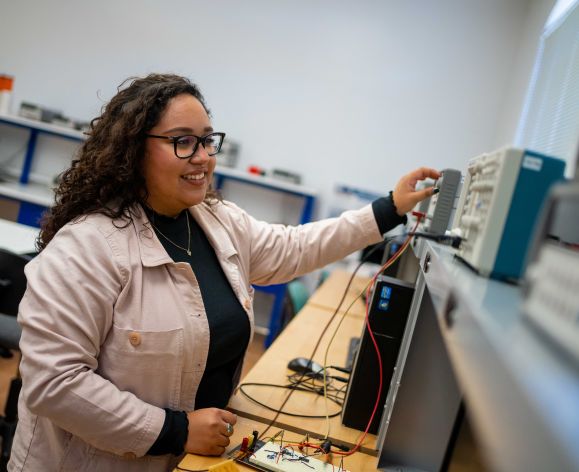
Graduation year: December 2021
Major: Electrical engineering
Hometown: Stockton, CA
Activities: Society of Hispanic Professional Engineers (SHPE) and Community Involvement Program (CIP)
What motivated you to study electrical engineering?
Monica: I used to be a math major before transferring to Pacific from a community college, but I thought I’d have a bigger impact on others if I study engineering, and design something new or improve a product that's already out there. And then my family was probably another motivation. I think they really pushed me to do what I really wanted. I also saw that there were a lot of opportunities in electrical engineering.
I think I discovered electrical engineering when I was taking a physics course back in the community college. I found it very interesting because we were learning about circuits and electromagnetism. So, I thought it was pretty cool to study something that you can't really see, but you can still understand it.
Why did you decide to study at Pacific?
Monica: A huge part of it was the Cooperative Education program at Pacific’s School of Engineering and Computer Science. Not a lot of schools in California have that, so it really caught my attention because it allows you to graduate with some work experience in the industry. Another thing that caught my attention was how you get to interact more with professors because the classes aren't that big.
At Delta College, I was part of the MESA program and my mentor, who had studied at Pacific and worked for the engineering department there, really pushed me to study at Pacific. I had also done a bunch of community service at Pacific, so I knew some people and I got to come on campus. And then, the MESA program had an event where you got to spend a day with the Pacific engineering students. I was able to sit in their classrooms and watch the lectures.
What are the benefits of being part of the SOECS Co-Op program?
Monica: The Co-Op is required for mechanical, civil and electrical engineers in order to graduate. For others, like bio and computer engineering, I don't think it's required, but the opportunity is there for them to take it.
The program consists of three classes which help you with building your resume and with interviewing, and then you get to apply for different internships during that semester. Once you get your internship, you work with your company for six to nine months as a paid intern. At the same time, you’re taking classes that guide you through what you learn. It's very important to do this program because you get to work in the field and get a work experience, you build your soft skills like communicating, presenting or writing. And you also make connections because you get to talk to real engineers and managers, and you work on real projects.
I got the opportunity to be on the other side, too, because I got to interview the new Co-Op students who joined the company I worked for. So, you get to see both sides of that industry.
What did you work on during your internship?
Monica: I worked for a medical company called Abbott located in Pleasanton, CA. One of the projects I got to work on was testing a heart pump to make sure that it worked properly and didn't cause any issues before it was updated and introduced to the public.
The heart pump extends your lifespan, whether you are waiting for a heart transplant or decide to live with the pump. A cool story that I like to tell is about a patient in Korea whose blood flow was too low for the heart pump settings, so when she was going to sleep the controller would set off the alarm every two minutes. The alarm is loud and annoying. I got to work on the update of that pump, like testing the software update and the documentation needed. It was pretty cool to work on it and see how it impacted someone directly. I think that was the highlight of my time at the Co-Op.
Did that experience help you decide what you're going to do after you graduate?
Monica: I think it definitely opened a different door because I like the power side of electrical engineering as well as the telecommunications side, but I had never even considered the medicine field because, honestly, I don't like bio. Now I’m definitely considering the medical device side as well.
What are the other ways that you can get that real-life experience at Pacific?
Monica: There are classes that require labs where you get to work with circuits, digital multimeters and other equipment. And then there’s the senior project which is two semesters. You work on a project from designing, to testing to actually building it.
My senior project was about a single face inverter. We'd take power from a battery and then we designed a circuit that would convert that output into a sinusoidal wave with specific frequency and specific power. It's practically like a cartridge which you can connect to the car battery, and then you connect a device that you want to charge, such as your phone. It is also used for solar systems, to convert DC power from solar panels into AC power.
In your opinion, what is unique about Pacific’s education?
Monica: I think it's just everyone wanting you to succeed and guiding you or providing resources for you to succeed. Knowing that you can go to any faculty and ask them for help, and their willingness to help is really genuine.
What advice would you give to any incoming Pacific students?
Monica: I’d say have fun and just take advantage of everything Pacific has to offer, from resources to events. Just take advantage of that and know that the help you get here is amazing.



